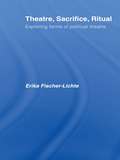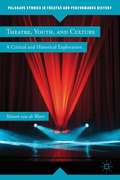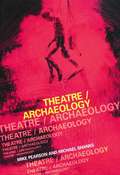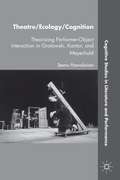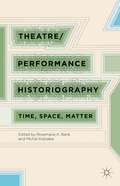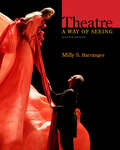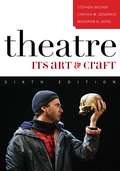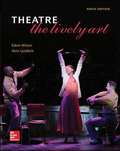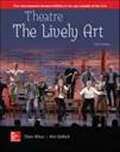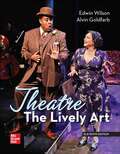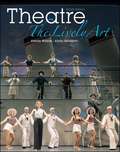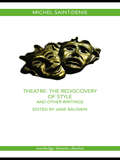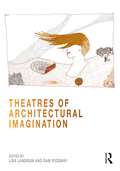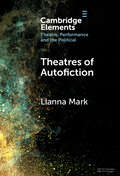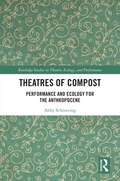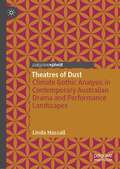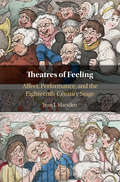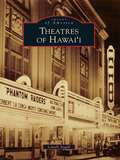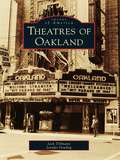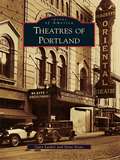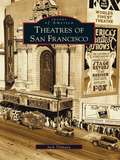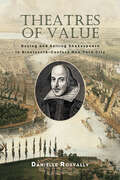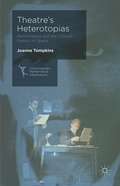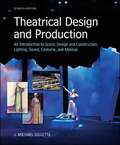- Table View
- List View
Theatre, Sacrifice, Ritual: Exploring Forms of Political Theatre
by Erika Fischer-LichteIn this fascinating volume, acclaimed theatre historian Erika Fischer-Lichte reflects on the role and meaning accorded to the theme of sacrifice in Western cultures as mirrored in particular fusions of theatre and ritual. Theatre, Sacrifice, Ritual presents a radical re-definition of ritual theatre through analysis of performances as diverse as: Max Reinhardt's new people's theatre the mass spectacles of post-revolutionary Russia American Zionist pageants the Olympic Games. In offering both a performative and a semiotic analysis of such performances, Fischer-Lichte expertly demonstrates how theatre and ritual are fused in order to tackle the problem of community-building in societies characterised by loss of solidarity and disintegration, and exposes the provocative connection between the utopian visions of community they suggest, and the notion of sacrifice. This innovative study of twentieth-century performative culture boldly examines the complexities of political theatre, propaganda and manipulation of the masses, and offers a revolutionary approach to the study of theatre and performance history.
Theatre, Youth, and Culture
by Manon van de WaterThere is a complex relationship between performance, youth, and the shifting material circumstances (social, cultural, economic, ideological, and political) under which theatre for children and youth birth through twenties is generated and perceived. Offering multiple, intersecting narratives, this book explores different aspect of theatre for young audiences (TYA) using examples from theatrical events in different geographical regions. The discussion of the history, theory, and practice of TYA indicates the wide variety of hitherto under-researched topics in the growing field of professional theatre for young people. "
Theatre/Archaeology: An Imperfect Archaeology
by Michael Shanks Mike PearsonTheatre/Archaeology is a provocative challenge to disciplinary practice and intellectual boundaries. It brings together radical proposals in both archaeological and performance theory to generate a startlingly original and intriguing methodological framework.
Theatre/Ecology/Cognition
by Teemu PaavolainenHow is performer-object interaction enacted and perceived in the theatre? How thereby are varieties of 'meaning' also enacted and perceived? Using cognitive theory and ecological ontology, Paavolainen investigates how the interplay of actors and objects affords a degree of enjoyment and understanding, whether or not the viewer speaks the language.
Theatre/Performance Historiography
by Michal Kobialka Rosemarie K. BankHow do the ethical implications of writing theatrical histories complicate the historiographical imperative in our current sociopolitical context? This volume investigates a historiography whose function is to be a mode of thinking and exposes the inner contradictions in social and ideological organizations of historical subjects.
Theatre/Theory/Theatre: The Major Critical Texts From Aristotle and Zeami to Soyinka and Havel (Applause Books)
by Daniel GerouldFrom Aristotle's Poetics to Vaclav Havel, the debate about the nature and function of theatre has been marked by controversy. Daniel Gerould's landmark work, Theatre/Theory/Theatre, collects history's most influential Eastern and Western dramatic theorists—poets, playwrights, directors and philosophers—whose ideas about theatre continue to shape its future. <p><p>In complete texts and choice excerpts spanning centuries, we see an ongoing dialogue and exchange of ideas between actors and directors like Craig and Meyerhold, and writers such as Nietzsche and Yeats. Each of Gerould's introductory essays shows fascinating insight into both the life and the theory of the author. From Horace to Soyinka, Corneille to Brecht, this is an indispensable compendium of the greatest dramatic theory ever written.
Theatre: A Way of Seeing
by Milly S. BarrangerConsistently praised as "streamlined" and "clear and student friendly," THEATRE: A WAY OF SEEING offers the beginning theatre student an exciting, full-color introduction to all aspects of theatre. It presents the experience of theatre, who sees it, what is seen, and where and how it is seen largely from the viewpoint of audiences exposed to a complex, living art that involves people, spaces, plays, designs, staging, forms, language, and productions. The book includes the appropriate coverage of the history, diversity, and most critical moments in theatre in a way that encourages students to experience theatre as "a performing art and humanistic event."
Theatre: Its Art and Craft
by Stephen Archer Cynthia M. Gendrich Woodrow B. HoodTheatre: Its Art and Craft is an introductory theatre text focusing on theatre practitioners and their processes. Using an accessible tone and a focused exploration of how theatre artists work, the book covers playwrights, directors, actors, designers of sets, costumes, props, lights, sound, and new technology, as well as the varying roles of scholars, critics, and dramaturgs. Appropriate for beginning theatre majors, minors, or non-majors, Theatre: Its Art and Craft helps students understand how theatre happens, who makes it, and what they do. Updated with new statistics, references, and photographs, the sixth edition now features an overhauled design section: the authors have divided the design chapter into two parts: one focused on the tactile elements of design (sets, costumes, props) and the second on the temporal elements (lights, sound, and new technologies).
Theatre: The Lively Art
by Edwin Wilson Alvin GoldfarbIn its ninth edition, Theatre: The Lively Art remains the best-selling program for Theatre Appreciation courses. With its hallmark focus on preparing future audience members, students will learn how theatre functions, how it should be viewed and judged, and the tradition behind any performance they may attend.
Theatre: The Lively Art
by Edwin Wilson Alvin GoldfarbTheatre: The Lively Art remains the best-selling program for Theatre Appreciation courses. With its hallmark focus on preparing future audience members, students will learn how theatre functions, how it should be viewed and judged, and the transition behind any performance they may attend.
Theatre: The Lively Art
by WilsonSeveral qualities set Theatre: The Lively Art apart from other introductory texts. A particularly important element is our emphasis on the audience. All students reading the book are potential theatregoers, not just during their college years but throughout their lives. We have therefore attempted to make This new edition is an ideal one-volume text to prepare students as future audience members. It will give them a grasp of how theatre functions, of how it should be viewed and judged, and of the tradition behind any performance they may attend. Lively Art allows instructors to focus on both the elements of the theatre and the history of the theatre. It also focuses on today's diverse and global theatre. In addition to serving as an ideal text for nonmajors, Theatre: The Lively Art will prepare students who wish to continue studies in theatre, as majors, minors, or students from other disciplines who take advanced courses.
Theatre: The Lively Art (8th Edition)
by Edwin Wilson Alvin GoldfarbTheatre: The Lively Art will provide the background to theatre and it will encourage and inspire students to become lifelong audience members, if not actual theatre artists.
Theatre: The Rediscovery of Style and Other Writings
by Michel Saint-DenisMichel Saint-Denis was one of twentieth century theatre’s most influential directors and theorists. This book combines his seminal Theatre: The Rediscovery of Style with material from Training for the Theatre, newly edited to create a work which moves seamlessly from theory to practice. Theatre: The Rediscovery of Style collects five of Saint Denis’ key lectures, given during his time in America, and perfectly encompasses his synergy of classical theatre and modern realism Training for the Theatre is a key practical resource for actors, directors and teachers alike. It covers crucial areas such as understanding a play’s context, training schedules, improvisation and dealing with stage space, as well as a section on Saint-Denis’ use of masks in actor training Theatre: The Rediscovery of Style and Other Writings benefits from Jane Baldwin’s new biographical introduction and annotations, that put Saint-Denis into context for a contemporary audience. It brings a wealth of inspirational material both to the rehearsal space and the classroom.
Theatres of Architectural Imagination
by Lisa LandrumThis volume explores connections between architecture and theatre, and encourages imagination in the design of buildings and social spaces. Imagination is arguably the architect’s most crucial capacity, underpinning memory, invention, and compassion. No simple power of the mind, architectural imagination is deeply embodied, social, and situational. Its performative potential and holistic scope may be best understood through the model of theatre. Theatres of Architectural Imagination examines the fertile relationship between theatre and architecture with essays, interviews and entr’actes arranged in three sections: Bodies, Settings, and (Inter)Actions. Contributions explore a global spectrum of examples and contexts, from ancient Rome and Renaissance Italy to modern Europe, North America, India, Iran, and Japan. Topics include the central role of the human body in design; the city as a place of political drama, protest, and phenomenal play; and world-making through language, gesture, and myth. Chapters also consider sacred and magical functions of theatre in Balinese and Persian settings; eccentric experiments at the Bauhaus and 1970 Osaka World Expo; and ecological action and collective healing amid contemporary climate chaos. Inspired by architect and educator Marco Frascari, the book performs as a Janus-like memory theatre, recalling and projecting the architect’s perennial task of reimagining a more meaningful world. This collection will delight and provoke thinkers and makers in theatrical arts and built environment disciplines, especially architecture, landscape, and urban design.
Theatres of Autofiction (Elements in Theatre, Performance and the Political)
by Lianna MarkThis Element is the first monograph to focus on the presence and popularity of autofiction in contemporary theatre, a mode characterised by its mixture of autobiographical and fictional materials and generally associated with the cutting edge of literary fiction. To do so, it brings frameworks from literary and theatre studies to bear on a recent upsurge in plays that explicitly mobilise lived experience and its fictionalisation to political ends. Considering a comparative corpus of state-subsidised productions in Britain and Europe since the mid 2010s – both adaptations of literary works and plays written for the stage – this Element attends to autofiction's aesthetics and politics through its negotiation on stage of three conceptual binaries, each the focus of a section: fact/fiction, self/other, and inclusion/exclusion. By probing the mode's critical potential and pitfalls, it sheds light on the stakes of self-fictionalising practices in today's cultural markets and on the role of theatre therein.
Theatres of Compost: Performance and Ecology for the Anthropocene (Routledge Studies in Theatre, Ecology, and Performance)
by Abby SchroeringTheatres of Compost places ecology at the center of performance scholarship and criticism, and it positions performance as a key cultural process for bringing about a more just and sustainable future.Examining a unique archive of agricultural performances—plays, theatre collectives, and activist rituals that engage questions of how humans use the land and produce food—this book lays out a framework for how theatre and performance contribute to a cultural shift toward ecological awareness. Theatre of compost is performance that directly engages ideologies of exploitation, mass production, and accumulation. Instead of discarding the forms, themes, methodologies, and histories that have perpetuated ecological destruction, the case studies in this book show that what has come before can be composted: broken down and reconstituted as the fertile foundation for a more livable life in the Anthropocene. Theatres of Compost will appeal to the new but quickly growing subfield of performance and ecology. As the climate and ecological crises worsen, more scholars and students in theatre and performance will be searching for ways to make their work meaningful and relevant.This book will be a helpful resource for graduate-level courses in performance studies, performance and ecology, and the environmental humanities.
Theatres of Dust: Climate Gothic Analysis in Contemporary Australian Drama and Performance Landscapes
by Linda HassallThrough a contemporary Gothic lens, the book explores theatre theories, processes and practices that explore; the impacts of continuing drought and natural disaster, the conflicts concerning resource extraction and mining and current political debates focussed on climate change denial. While these issues can be argued from various political and economic platforms, theatrical investigations as discussed here suggest that scholars and theatre makers are becoming empowered to dramaturgically explore the ecological challenges we face now and may face in the future. In doing so the book proposes that theatre can engage in not only climate change analysis and discussion but can develop climate literacies in a broader socio-cultural context.
Theatres of Feeling: Affect, Performance, and the Eighteenth-Century Stage
by Jean I. MarsdenTheatre and theatregoing was central to the cultural life of later eighteenth-century Britain. In this engaging work, Jean I. Marsden explores the playhouse as a source of emotion during a period when the ability to feel demonstrated moral worth. Using first-hand accounts, reviews, and illustrations to complement the drama of the era, Marsden examines why both critics and audiences elevated the theatre above the pulpit and how they experienced the plays and performances that they witnessed. Tears and even fainting fits were a common reaction to powerful productions, and playwrights sought to harness this emotion. The book explores this intersection of text, performance, and affect in a series of case studies of plays exploring British liberty, empire and the evils of antisemitism. With a focus on emotional response, Theatres of Feeling delivers a new approach to dramatic literature and performance, one that moves beyond more limited studies of text or performance.
Theatres of Hawai'i
by Lowell AngellFamous for its lush beauty and inviting beaches, Hawai'i also boasts a rich theatrical history dating back to the mid-19th century and spanning its years as a kingdom, U.S. territory, and a state. Its warm, tropical climate and social, cultural, and ethnic diversity contributed to the variety of theatres unique to the islands--from simple, rural plantation theatres on the neighbor islands, to neighborhood movie houses in exotic styles, to an incomparable tropical moderne jewel near the beach at Waikiki. Most of these theatres are now just a memory, except for those few saved by dedicated individuals and restored for another life. This book celebrates the rich history of these theatrical venues through rare archival photographs and little-known details.
Theatres of Oakland
by Jack Tillmany Jennifer DowlingOakland has a rich theatre history, from the amusements of a gas-lit downtown light opera and vaudeville stage in the 1870s to the ornate cinematic escape portals of the Great Depression. Dozens of neighborhood theatres, once the site of family outings and first dates, remain cherished memories in the lives of Oaklanders. The city can still boast three fabulous movie palaces from the golden age of cinema: the incomparable art deco Paramount, which now offers live performances and films; the stately Grand Lake gracing the sinuous shores of Lake Merritt; and the magnificently eccentric Fox Oakland, with its imposing Hindu gods flanking the stage. The Paramount and Grand Lake still stir the heartstrings of patrons with showings preceded by interludes on their mighty Wurlitzer organs.
Theatres of Portland
by Steve Stone Gary LacherPortland's theatre history is marked by early enthusiasm and exceptionally vigorous growth. With the Pacific Northwest's often rainy weather, people sought refuge in movie entertainment, and the city eventually grew to have more theatre seats per capita than similar-sized cities in the United States. Beginning with short cinema segments at vaudeville houses downtown, Portland movie theatres came into their own swiftly and ambitiously. By 1915, there were over 70 individual theatres showing films both downtown and in neighborhoods throughout the city. By the 1920s, larger theatres were being built, including substantial neighborhood palaces such as the Bagdad, Hollywood, and Oriental. Meanwhile, downtown provided the Broadway, Portland, and Orpheum, to name a few. This volume contains an overview of Portland's theatre history through rare and newly discovered historical photographs of those memorable places of entertainment.
Theatres of San Francisco
by Jack TillmanyYou read the sad stories in the papers: another ornate, 1920s, single-screen theatre closes, to be demolished and replaced by a strip mall. That's progress, and in this 20-screen multiplex world, it's happening more and more. Only a handful of the 100 or so neighborhood theatres that once graced these streets are left in San Francisco, but they live on in the photographs featured in this book. The heyday of such venues as the Clay, Noe, Metro, New Mission, Alexandria, Coronet, Fox, Uptown, Coliseum, Surf, El Rey, and Royal was a time when San Franciscans thronged to the movies and vaudeville shows, dressed to the hilt, to see and be seen in majestic art deco palaces. Unfortunately, this era has passed into history despite the dedicated efforts of many neighborhood preservation groups.
Theatres of Value: Buying and Selling Shakespeare in Nineteenth-Century New York City
by Danielle RosvallyTheatres of Value explores the idea that buying and selling are performative acts and offers a paradigm for deeper study of these acts—"the dramaturgy of value." Modeling this multifaceted approach, the book explores six case studies to show how and why Shakespeare had value for nineteenth-century New Yorkers. In considering William Brown's African Theater, P. T. Barnum's American Museum and Lecture Hall, Fanny Kemble's American reading career, the Booth family brand, the memorial statue of Shakespeare in Central Park, and an 1888 benefit performance of Hamlet to theatrical impresario Lester Wallack, Theatres of Value traces a history of audience engagement with Shakespearean cultural capital and the myriad ways this engagement was leveraged by theatrical businesspeople.
Theatre’s Heterotopias
by Joanne TompkinsTheatre's Heterotopias articulates a new methodology for interpreting a space (including architectural, narrative, imaginative, and imaginary) in theatre and performance. A heterotopia is an 'alternative space' that is distinguished from that actual world, but that resonates with it. The value in applying heterotopia to theatre is that in performance, we can actually witness how else space and place might be constituted: it is the point of comparison of what does occur against what else might transpire such that the 'unreal' spaces that comprise a theatrical experience have the capacity to elicit concrete effects beyond its walls. A heterotopia is a technique for exploring theatrical space that affords a better understanding of the theatrical experience, the context in which performance takes place, and the power and knowledge that shape its socio-political context. The book's case studies include site-specificity, selected productions from the National Theatre of Scotland and Shakespeare's Globe, and multimedia performance.
Theatrical Design And Production: An Introduction To Scene Design And Construction, Lighting, Sound, Costume, And Makeup
by J. GilletteTheatrical Design and Production is a comprehensive and practical survey that examines the technical and design aspects of play production, including scene design and construction, lighting, sound, costume, and makeup. Design is presented as both an art closely integrated with the director’s, actor’s, and playwright’s visions, and a craft that provides practical solutions for the physical manipulation of stage space.
